What You Need To Know About Cash Homebuyers
There are more cash homebuyers out there than ever before. Understanding the different types of business models will help you decide if cash homebuyers are right for you.
Times are changing when it comes to selling your home. What was traditionally accepted, no longer has to be the norm. The long, often drawn-out process of preparing your house, listing it, and waiting for it to sell, is not required.
The traditional way is a lot to take on, especially if you’re trying to sell your home fast. Working with a cash homebuyer, you don’t have to maintain an immaculate home while showings take place, and worry over whether financing will go through on closing day.
But these days, home sellers have more options than ever before. The rise in real estate technology companies and new types of property investors provides a lengthy menu of alternatives to the traditional home sale. Some of these options help make home sales faster, easier, and requiring less work for the homeowner.
However, it’s important to know what you’re getting into with cash homebuyers.
A buyer paying in cash vs. a cash homebuyer
First, we should clarify an important point. There are two different types of home sales dealing in cash. When you choose to sell your house on the market, you may get a cash offer from a homebuyer. In this case, you’re simply getting an offer from a buyer who isn’t financing the purchase with a mortgage.
With this type of transaction, you’ll still have to put your home on the market, wait for an offer to come in, and then go through the due diligence process that leads to closing. The benefit is that there’s no risk of the offer falling through at the last minute. There’s no bank involved.
Cash homebuyers are something different. They’re usually not purchasing a home on the MLS (multiple listing service). And they’re almost certainly not buying a home to live in it.
Instead, cash homebuyers are a form of real estate investor. Most are interested in paying cash to buy your home off market, avoiding the traditional home sale process entirely. Often, they buy homes as is, and then invest the money to make repairs before selling or renting the property.
There are several different types of cash homebuyer business models, including the way Sundae works. Each type offers a different value for a different home seller need. In nearly all cases, working with a cash homebuyer is a way to move a transaction on a much faster timeline.
Selling to a cash homebuyer is like a dealership buying back your car
While these transactions are not uncommon, understanding how it works when an investor buys your home can feel complicated. Most off-market buyers are businesses rather than individuals. This means you’re selling your home to someone who is going to re-sell it for profit.
That kind of transaction may feel uncomfortable for some sellers. But one way to think about it is to compare it to a car.
If you’re planning to sell a used car, rather than detailing it and fixing it up yourself, you have the option to trade it in to a dealer or let the dealership buy it back. They’ll take care of repairs and get it ready to sell on their own used car lot. While they will sell it for more than the price they paid you for it, you’ve saved the time and energy of handling the process yourself.
The same is true when a cash homebuyer invests in your home. They take the stress of readying your home for the market off your hands. You don’t have to make repairs, or worry about financing falling through. The homebuyer speeds up the home sale process and ensures a smooth and quick transition for you.
The different types of cash homebuyers
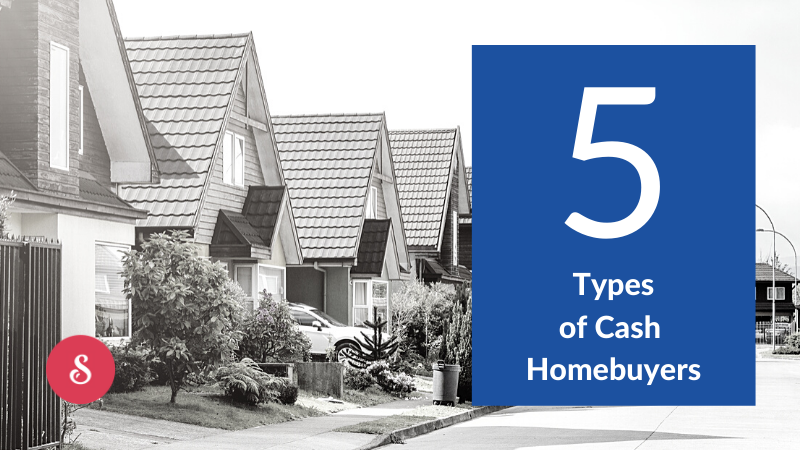
While the fundamentals are the same, working with different cash homebuyers means different details to manage. Some are looking to do a quick fix and flip on your house, while others want a bigger project. Some will evaluate their offer by compiling data, others will spend the time looking at your home.
Finding the right type of cash homebuyer for you requires learning the specifics of each type and pairing it with your needs. Here we walk you through the five most common types of cash homebuyers.
1. Off-market buyers

One of the easiest ways to sell your home to a cash homebuyer is to work with an off-market buyer. An off-market buyer purchases your house without any need to sell it through the traditional MLS process.
Putting a human touch on this type of buying, they’ll usually operate by sending someone to see your house in person. Off-market buyers strive to give you a fair price for your home as is. You won’t have to make repairs or tidy the place up. The closing process is typically low maintenance, and associated costs and fees tend to be limited.
Most off-market buyers try to make an offer within a couple days. They are also pretty flexible in terms of when you can close. This gives you some time to plan your next move. Once the sale is complete, off-market buyers do repairs on the house before selling it.
They fill a need in the market for sellers who don’t have a “move-in ready” home. And for those who don’t have the time, money, or interest to prepare a house and go through a market sale.
2. iBuyers
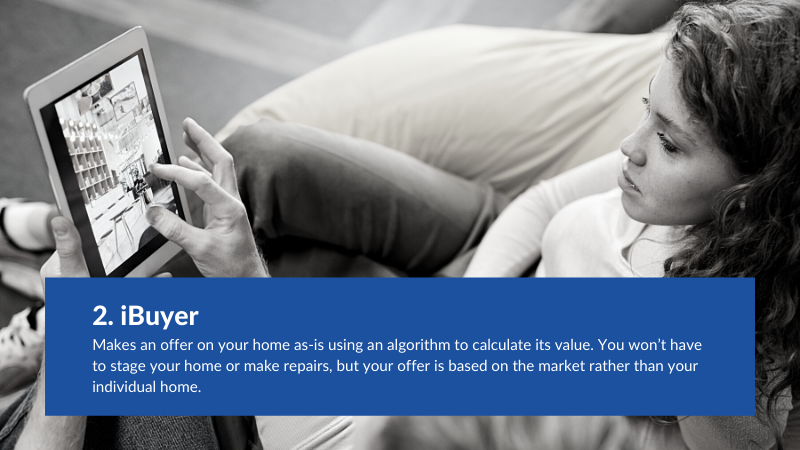
Short for instant buyer, iBuyers incorporate technology into their home offer process. Rather than deeply evaluate each home on its own, an iBuyer uses automated valuation models to generate a competitive offer. These algorithms take into account comparable homes in the area and other market data. iBuyers typically charge fees that may run between five and 15 percent.
iBuyers want to buy your home fast because their business depends on quick turnarounds. To make a profit, they must turn over a high volume of homes. The technology they use helps streamline the process, but it doesn’t factor in special circumstances that might alter the value of your home when calculated in a different way.
Like with using an off-market buyer, there’s no staging and no huge time investment to sell your home. However, most iBuyers look for houses that are in close to market-ready conditions. They ask for repairs or negotiate price changes to account for repair work, before they make a final offer.
See also: Difference Between Sundae and an iBuyer
3. House flippers (or fix and flippers)
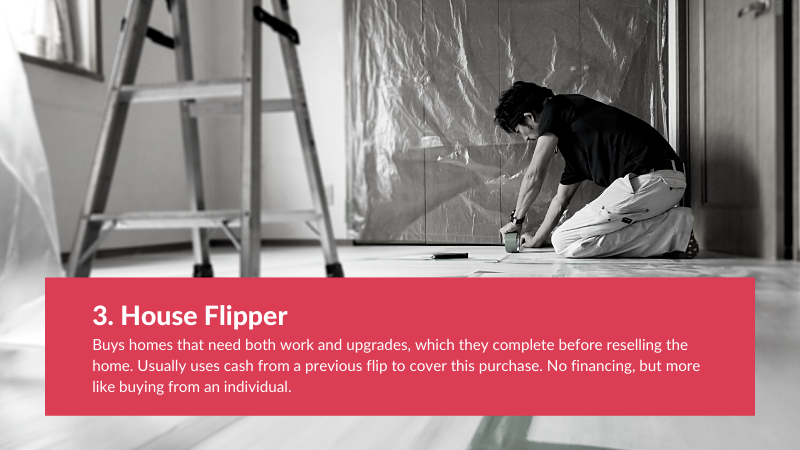
Flippers, like so many you see today on TV, like to make cash offers. But they’re looking for a different type of house. They want something that’s priced well below market value.
Often purchasing a home in the more traditional way, they don’t always evaluate a home like off-market buyers and iBuyers do before making an offer. This is because their intention isn’t only to repair the home. Flippers usually want to make changes to the home that will drastically increase resale value.
They’re interested in updates with a high return, and are incentivized to maximize profit. For this reason, it’s important to look out for predatory buyers, who may put profit motive above treating you fairly and honestly.
Some house flippers may also be off-market buyers who will approach you before the home is listed for sale. But in many cases, flippers appear after you’ve already gone through the process of listing your home and readying it for the market.
Like most cash buyers, they want to do it fast, which is why they’ll often ask for a short due diligence period. The sales process, though more traditional, is also pretty fast. House flippers don’t look at a home and see what’s wrong, they see what they can fix and change. As a result, when they find a home they want, they move as fast as possible. They also often rely on hard money loans, which means they need to move fast to pay back what they owe.
4. Buy-and-hold investors
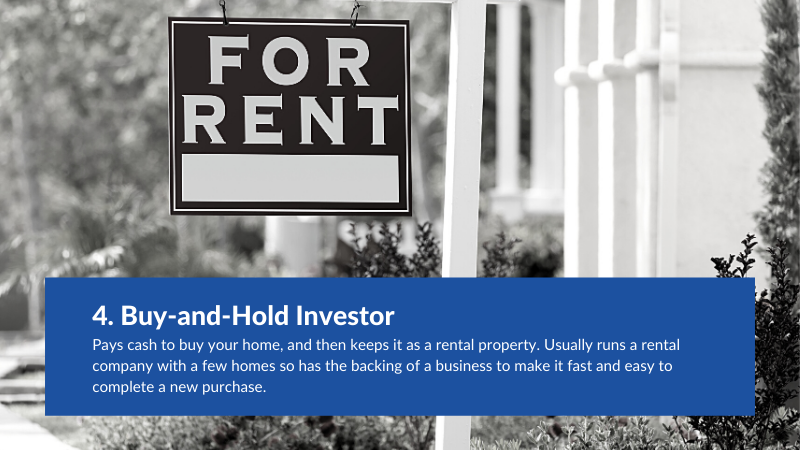
Another unique way cash homebuyers invest in a home is through renting it out. These buyers are different because they use the house as a source of passive income, with no intention of living in it. Owning enough properties like this can become a business unto itself, which makes working with buy-and-hold investors feel more rigid.
Additionally, because they’re looking at your home as an investment to keep rather than one to sell, they may see your home’s value differently than a typical buyer would.
The benefit to the seller is, once again, your time. When compared to someone who wants to flip your home, a buy-and-hold investor is usually more flexible with closing and can offer a better price. They may already own properties nearby. This is because they usually focus on areas close to where they’re located, making it easier for them to manage the property. Targeting a particular area helps them evaluate your home more effectively.
5. Investor marketplace (Sundae)
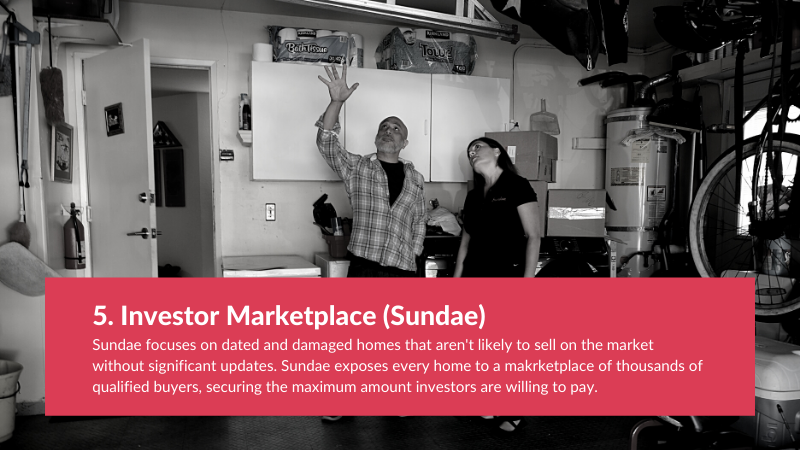
Potentially the most unique type of cash homebuyer is an investor marketplace that exposes your house to a large number of interested property investors and homebuyers. These individual homebuyers can bid on the property, leading to a potentially higher off-market price than selling directly to one investor.
Most homebuyers want modern amenities and move-in ready houses. But for homeowners who don’t have the money or time to do the needed upgrades themselves, choosing an off-market cash homebuyer is not always an easy task. And it subjects their home sale to a lower potential offer price. Sundae’s model of offering houses to an investor marketplace helps secure the maximum amount investors are willing to pay.
Related: How to Decide If Sundae Is Right for You
Not all cash home buyers are created equal
Unfortunately, there’s no certification that makes someone a legitimate cash homebuyer. While individuals in the five categories above will most likely conduct themselves professionally, there are plenty of bad actors in the business.
When working with a cash homebuyer you should expect the process to feel comfortable and similar to a traditional home purchase. Whoever you work with should be responsive and communicative. If you ask for a breakdown of an offer, they should provide it.
If a homebuyer does any of the following, it should raise a red flag:
- Asks you to transfer over the deed to the house before the actual closing.
- Continues to “update” the offer agreement after you’ve signed the initial contract.
- Wants to purchase your home without seeing it first. They may even claim they live outside the country and can’t be present at any point.
- Provides you with an long list of changes after an inspection, and wants to make unreasonable adjustments to the price of your offer.
If any of these issues come up, take a step back. Verify the person or business online through Google, Yelp, or the Better Business Bureau. Also, make sure to read any contract or contract revision thoroughly, from any cash homebuyer. This is a beneficial and legal way to buy homes, but like with all businesses, doing your due diligence is important.
Hear what customers say about Sundae on our Customer Reviews page.
The right cash home buyer makes a world of difference
Regardless of who you work with, selling your house to a cash homebuyer has a clear benefit — saving you time. All the time you would spend staging your home and making repairs, you get back. All the time you spend waiting for your house to sell, you get back. Lastly, all the time you spend waiting for a buyer’s financing to get approved, you get back.
A cash homebuyer can take a stressful situation and turn it into something fast, safe, and efficient. But picking the right buyer is key. Making sure you’ve got a professional and reliable homebuyer in your corner is essential.
Ready to Get Started?
Sell as-is. Pay zero fees to Sundae. Move on your time. No repairs, cleanings, or showings.
